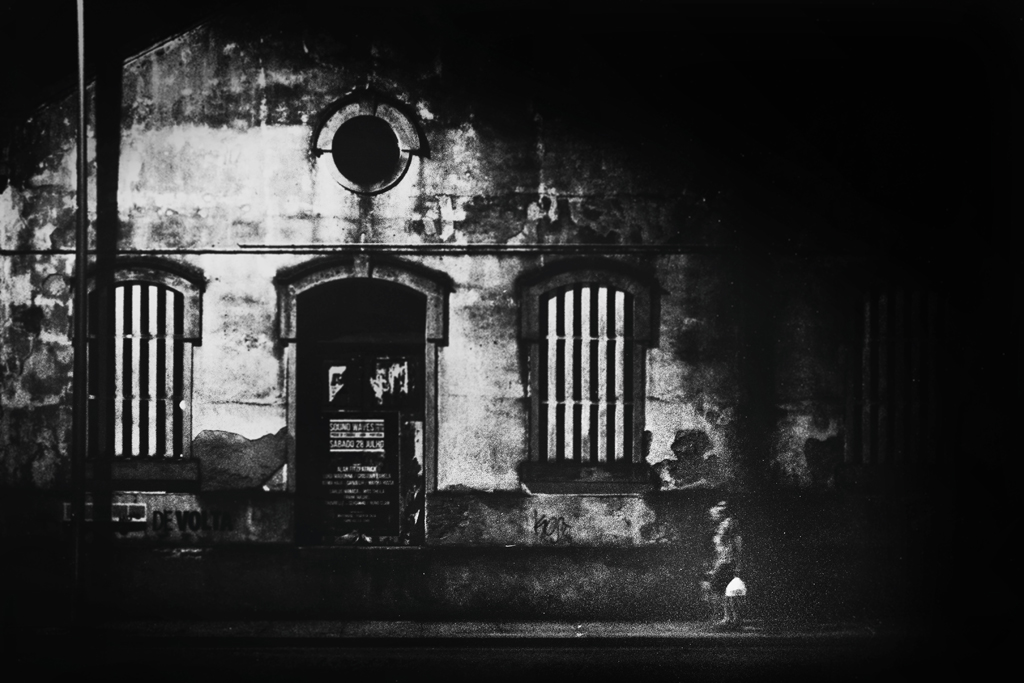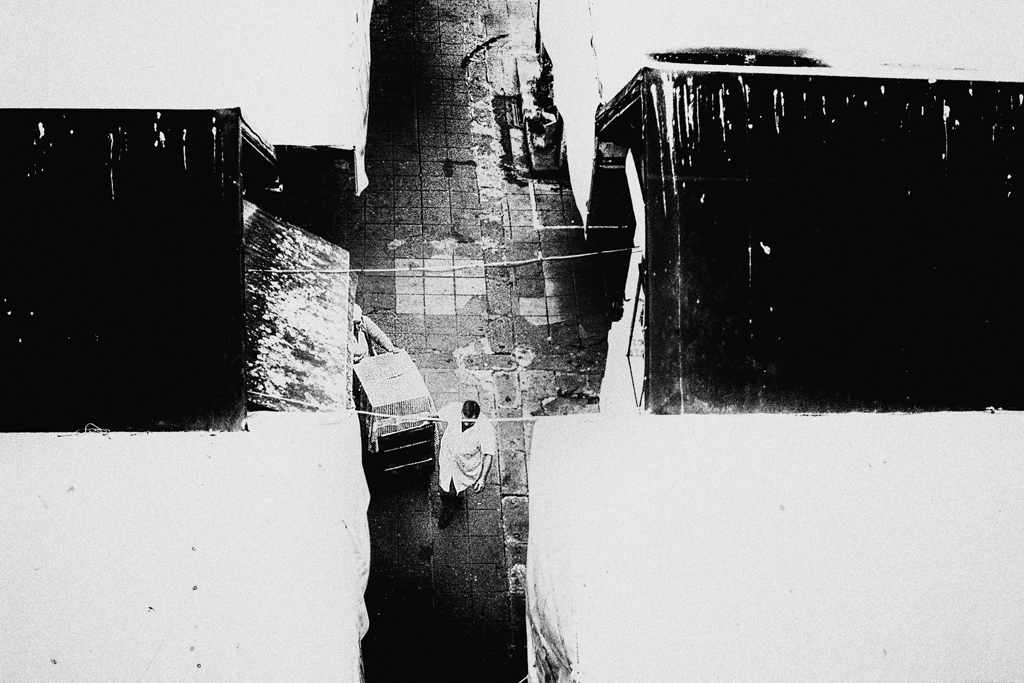“analogue causes a great
transformation in your way
of photographing, it forces you
to carefully visualize and
anticipate the moment…”
____________________________________________________________
Interview with Rui Correia
by Paulo Abrantes
2020

crying wind Rui Correia © All rights reserved

before the storm Rui Correia © All rights reserved

loving you sunday morning Rui Correia © All rights reserved

closing time Rui Correia © All rights reserved
Introduction
Rui Correia is a Portuguese amateur photographer who lives in a small village in the centre of Portugal. Born in the beginning of the 70’s, he shoots in both digital and analogue, though these last years a major part of his work is with film. Shooting almost exclusively in B&W, now and then he also “goes for a ride” in the colour world, always with film. He shoots for mood in the streets, composing for atmosphere rather than the reality of the situation, achieving many times a completely abstract composition from the reality starting point. The taste for deeply B&W images takes him into the street in search of this game of light and shadow.
How and when did this taste for photography begin?
Since I remember that I like photography. In my youth I still have the memory of my father’s old AGFA, certainly the first camera with which I had contact.
But it was only in my twenties that I bought my first film camera, an APS and later I also remember buying a Pentax zoom which I used for some years.
However, the first more serious steps were taken later and in digital photography, when in 2010 I bought my first digital reflex camera. At the time, a kit camera, with which I truly started taking more seriously this photography experience. It was around that time that I also started to take some training in photography initiation, having later also attended training in composition and editing.
Besides that, I have always been a self-taught photographer.

killing moon Rui Correia © All rights reserved

silent pain Rui Correia © All rights reserved
And when did the analogue come up?
It was in 2017, in digital era, that due to the challenge of a friend, I decided to buy an analogue camera, a Halina 35. At the time, and more for the curiosity to start shooting again in analogue, I began shooting some rolls again. I think analogue was love at first sight, however it was not an easy relationship at first…
But why?
For those who spent years photographing in digital, with the photos very focused, with everything very clear…. starting to receive the first negatives revealed full of grain, in which the subject was unfocused or out of frame, in which the speed or aperture were not the best, in which the development was not very good and having to deal with light leaks or vignettes, was not easy to accept.
But it was around that time that a click took place in my head and I realized the path I wanted to take in photography… that was my style, it was what I most identified myself with.
Gradually I evolved in analogue and today I photograph almost (not to say only) exclusively in analogue.
Right now I have no doubt that digital photography is much easier. The analogue easily discourages anyone who begins to take the first steps, but it is in this discouragement that mistakes can become learnings.
And what transformation has the analogue caused?
As I said before, I had already photographed analogue in my youth. However, it was only recently that I started to take analogue more seriously and to discover the other possibilities that it offers.
I had to stop being so anxious…. with analogue there is no anxiety, or better, you start to deal with it differently. Any exposure you make, you only see the final result after some time, so there’s no meaning in searching the result on the back of the camera…. it has nothing to show you!!
I know it seems like a nonsense… but if we think about it, we realize that what we do instinctively when shooting in digital, is to anxiously look for the result of the photo in the viewfinder. And if we are not satisfied, we will take half a dozen more, just in case.
The analogue causes a great transformation in your way of photographing, it forces you to carefully visualize and anticipate the moment, to think about the photo in another way, to choose the best frame and wait for “that” magical moment. It forces you to measure the light more carefully and does not give you the opportunity to fail. In digital, if you fail the click you can redo everything in the next frame. It was a big paradigm shift and a different experience.
I think that it is the whole ritual that precedes the click that makes the analogue unique. The process of choosing the film, choosing the camera, waiting to see the results of the developed film, creates an aura of mystery and, at the same time, a self-challenge…
In my digital days, I usually arrived home at the end of the day with a few hundred photos on the camera’s card, nowadays I come home with a roll of 36 photos exposed and the great satisfaction for knowing that those 36 moments were intensively lived.

slow life beneath the skin Rui Correia © All rights reserved

Love Lost Rui Correia © All rights reserved
I started to shoot less, I spend a lot less time editing, which leaves me time for other things.
As with everything in your life, goal setting is extremely important. In photography, it was very important for me at some point to have set goals that I wanted to achieve.
Why the analogue mood?
I mainly do street photography and, in my point of view, that photo must first of all convey a certain mood. More than having an appealing composition, photography must have a story behind it, it must tell a visual story and awaken the emotional side of those who see it.
When I photograph I try to capture the nostalgic and melancholic mood of the streets and try to convey the emotion of the story that was behind that click. I think this sentimental mood is easier to transmit through black and white.
We must think more about how our photos make us feel, photography will only make sense if first of all you enjoy yourself doing it and if you like it first.
I think that in this task the analogue allows me without any doubt to reach the mood I want for my photos and helps me to transmit that message.

take the long way home Rui Correia © All rights reserved

bitter past Rui Correia © All rights reserved
The shades and transitions that photographic film allows us to achieve are difficult to obtain in digital, and then it is possible with different types of film to achieve different results. This is also the challenge of the analogue.
What are your influences?
In Portugal, we have great photographers like Eduardo Gageiro, Alfredo Cunha, Paulo Nozolino, who are always a great reference. Abroad, there are many others that I like a lot, from those I highlight, for example, the great poet photographer Mario Giancomelli. There is also a generation of Japanese photographers that emerged in the 60s and 70s and that dominated in Japan, with a more radical and innovative style of photography, completely “out of the box”, which favoured a more confusing and chaotic dimension, renouncing capturing the reality as we see it. At this moment, I am fascinated by this sensitivity of Japanese photography, which is one of my greatest inspirations in terms of influence.
Sooner or later each photographer ends up defining his personal style, the one with which he most identifies and feels familiar with. This learning process and personal growth is often influenced by the photos we see and the books we read.
What is your style, how do you define yourself?
I don’t know if I can say that I already have my own style. I can certainly say that street photography is the one where I feel at ease and which better defines me.
I try to shoot for the mood in the streets, composing for the atmosphere and not for the reality of the situation, trying to achieve a completely abstract result from the starting point of reality. In my pictures blacks normally dominate, they are the way to hide the details that are not important and add nothing to the final result.
The taste for deeply black and white images makes me wander the streets in search of this game of light and shadow.
And the medium format?
It is a more recent discovery. I have taken the first steps and tried some pictures, but most are only experiences. It will be a project for the future and always connected to street photography for sure.

counting the days Rui Correia © All rights reserved

And other projects for the future?
I think that photography is like a wedding, after a while you start thinking about having a child… In photography, I think the same thing happens, after a while you’re a little tired of always seeing your photos on the computer, you start to think about printing some to see the final result in your hands.
I truly enjoy to feel the photos on paper. It is the culmination of a journey that started with a click. Turning the photographs into paper, more specifically in book format, will be a future challenge. Another project that I have already started, involves shooting with colour film.

an ocean in between the waves Rui Correia © All rights reserved

shining in the sun Rui Correia © All rights reserved

Destinies Entwined Rui Correia © All rights reserved

tomorrow is nearly yesterday Rui Correia © All rights reserved

hulk Rui Correia © All rights reserved

bumper cars Rui Correia © All rights reserved

as far as my eyes can see Rui Correia © All rights reserved

black sands Rui Correia © All rights reserved

end of the line Rui Correia © All rights reserved

the silence Rui Correia © All rights reserved

empty skies Rui Correia © All rights reserved

before she says yes Rui Correia © All rights reserved

beneath this tired ground Rui Correia © All rights reserved

world beyond Rui Correia © All rights reserved

life after sadness Rui Correia © All rights reserved
____________________________________________________________

You must be logged in to post a comment.